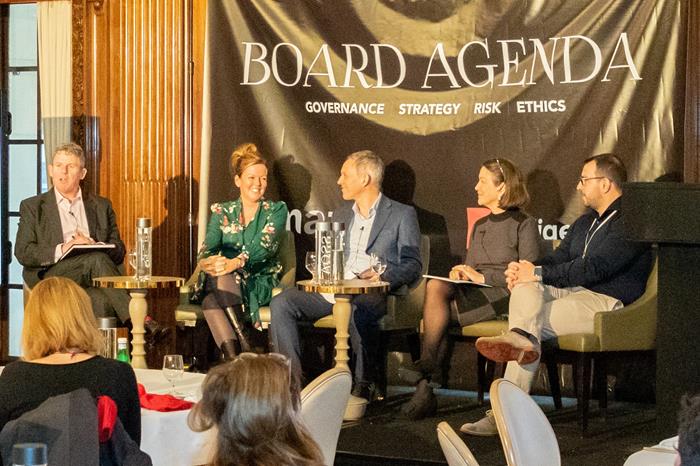Boards are without much of the basic knowledge needed to grapple with the complexity of climate change and biodiversity loss, according to one of the leading business academics in the country.
Ioannis Ioannou, professor of strategy and entrepreneurship at London Business School, told delegates, at a Board Agenda breakfast briefing exploring corporate resilience, that boards might not progress without basic knowledge.
“In order to grasp the complexity of all this, in an ideal world, here’s what you need: you need a board on which all of these environmental and social challenges are actually represented.
“You have people that understand the climate risk, you have people that understand biodiversity collapse, you have people who understand the planetary boundaries and why we’re overstepping them.
“In other words, you need the basic awareness and understanding and I think that’s fundamentally lacking.”
Another panel member, Chris Fuggle, global head of sustainability at Mazars, the professional services firm, said that recent research revealed 39% of boards believe they do not receive enough information about ESG to fulfil their obligations.
Context required
He said it was important for boards to understand the “drivers” for a move to an ESG agenda. “Once we’ve got that context, then we can address the data issue.”
Sally Uren, chief executive of Forum for the Future, a climate advisory firm, said “awareness raising” remains a big issue among boards. She said she had recently come across a chief executive who did not know what scope 1, 2, and 3 emissions were.
“But it’s really important to have that conversation in a generative and a constructive way, and to get people excited about the possibility of responding to our climate emergency,” she said.
Making progress on climate change and other ESG issues, she added, would depend on the quality of leadership.
This was an argument also made by Susan Hooper, a non-executive and founder of Chapter Zero, an organisation providing climate training to non-executives. Leaders, she said, need to ready themselves for decision making without foolproof information, making the qualities of the chief executive crucial.
‘An unprecedented problem’
“We are talking about addressing an unprecedented problem with the present systems and structures we’ve got.
“We don’t know what’s going to happen. I’ve sat on a board for 25 years and I’ve never been in a situation where we would be happy to make a decision without clarity of information. And that’s going to have to be dealt with somehow.
“The CEO is probably the most pivotal leader that you have in an organisation. That CEO needs to have characteristics that can manage with uncertainty. We’ve not developed that skillset in the past.”
The panels also reflected on a warning: companies may have to consider that transitioning to net zero may involve some years without growth. Ioannou said many corporates, though not all, would be part of a “global cost correction”.
“Companies need to understand that it’s time to pay the bill. A lot of these things are not going to be growth opportunities; they’re not going to be the next growth phase of the company.”
He added: “The more you understand that, and the more you invest for that world in which those [costs] are internalised, the better you’re going to be.”
However, there was some concern about the role of investors in supporting transitions.
Some investors, noted Susan Hooper, have baulked at low or no growth for their investments after pushing companies to be at the “forefront” of ESG changes. Some had even walked away from companies that said they would have to “take a step from growth and profit” to “get to the right place”.
“This again comes back to leadership,” she said. “Are you actually going to do the right thing, regardless of these counterforces? Or are you going to wait and see what happens?”





